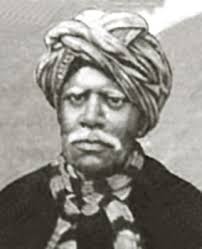Rao Bahadur Kandukuri Veeresalingam Pantulu was considered as the ‘Father of renaissance movement in Telugu.’ He was born on 16 April 1848 at Rajahmundry, Andhra Pradesh. He was a social reformer and writer at Madras Presidency, under British rule. This article briefly shares the chronology of important events in his life including his 5 important works.
Aspirants would find this article very helpful while preparing for the IAS Exam.
| To complement your preparation in the History segment of the UPSC exams, check the following links: |

Kandukuri Veeresalingam Biography
- Veeresalingam was born to an orthodox Brahmin family as the son of Subbarayudu and Poornamma. He lost his father when he was just four and was raised by his paternal uncle.
- He studied in local schools where his academic brilliance and good nature earned him accolades.
- After completing his matriculation in 1869, Veeresalingam started work as a school teacher in a village.
- Veeresalingam was a scholar of three languages namely, Telugu, Sanskrit and English. He wrote the first novel in the Telugu language. He is also credited with introducing the autobiography and the essay into Telugu literature. He also authored the first Telugu book on modern science. Apart from these, he composed many ballads and plays in Telugu. He also translated famous English works into Telugu.
- He is most revered for his contribution to the reformation of Telugu society. While more people are aware of the contributions of Raja Ram Mohan Roy and Keshub Chandra Sen, Veeresalingam’s fame outside Andhra is restricted and this does him no justice.
- He wrote extensively for the emancipation of women. His works were predominantly satires on the then-existing amorality, superstitions, double standards and degradation in society. He advocated widow remarriage and denounced child marriages as well as the practice of marrying off young girls to much older men.
- His sharp criticism bought him many enemies. He was ridiculed publicly for his “radical” thoughts and advocacies.
- To counter his detractors, he used the ancient scriptures to portray that women were not always regarded, secondary citizens. He made people aware that in the Ramayana, Lord Ram was always accompanied by Sita in the assembly by his side.
- He also declared that India started veering towards the path of decline only when the condition of women deteriorated.
- He set up schools for the education of girls and women. He also performed the first widow remarriage in Andhra Pradesh, on December 11th, 1881. He was censured by the conservative society of that time.
- Despite society’s heavy scorn, he helped marry off about 40 widows in his lifetime.
- He published various magazines and journals wherein he championed the cause of women and education.
- In 1887, he started a Brahmo Mandir at Rajahmundry.
- Veeresalingam was one of the first few to attend the maiden session of the Indian National Congress in 1885.
- In 1893, the government of India conferred the title ‘Rao Bahadur’ on him.
- He passed away on 27th May, 1919 aged 71.
Veeresalingam – Important Works
- Rajasekhara Charitra (first Telugu novel)
- Brahma Vivaham (play)
- Gopala Satakamu
- Abhagyopakhyanamu (a satire on society)
Frequently Asked Questions Related to Kandukuri Veeresalingam
What was the role of Kandukuri Veeresalingam when it came to social reforms in Southern India?
Who inspired the ideals that drove Kandukuri Veeresalingam?
Kandukuri Veeresalingam – Download PDF Here
Also on this day
1853: India’s first passenger train from Bombay to Thane.
See previous ‘This Day in History’ here.
| Also See | |||
| 19th Century Social and Religious Reform Movements | |||
| Ishwar Chandra Vidyasagar | |||
| Swami Vivekananda | |||
Aspirants can become familiar with the general pattern of the IAS exam by visiting the IAS Syllabus page. For more preparation materials they can refer to the links given in the table below:
Related Links
| NCERT Books | UPSC Exam Pattern | Current Affairs Quiz |
| Subsidiary Alliance | Bharatmala Pariyojana | PIB Summary and Analysis |
| Green Revolution in India | Pradhan Mantri Matritva Vandana Yojana | Project Tiger |
Comments